
Excessive screen time is usually something people worry about regarding their children. On average, children ranging from 8 to 18 spend an estimated 7 1/2 hours a day watching or using their screens, according to the American Academy of Child & Adolescent Psychiatry. Most parents are trying their hardest to offset the time their kids spend on tablets with something more beneficial.
However, a study from Talker Research and Centrum Silver found that parents should actually be holding up a mirror instead of pointing fingers when it comes to tech addiction. The survey found that in adults over 50, their screen time habits mirrored those of younger generations, meaning they are just as bad as “kids these days.”
Teona Swift| Shutterstock
The survey of 2,000 Americans aged 50 and over revealed that most of their screen time was spent watching TV, closely followed by searching the web, playing a game, and just working on the computer. Most older adults also spend time talking on the phone, video-chatting, scrolling through social media, and reading on their e-reader or tablet.
Despite how much older adults are using technology, many have heard that excessive screen time can be harmful, from being “addictive” (39%) to “rotting the brain” (23%).
: Science Says Avoiding Screens For A Day Will Not Reset Your Dopamine, But These 4 Activities Will
More than three-quarters (78%) of older adults worry about cognitive aging, and nearly all (96%) say it’s important for them to maintain their cognitive abilities and memory as they continue to age.
“The survey findings reveal a real tension: many older adults see screen time as a daily part of life, even as they worry it could be harmful,” explained Josh Gabriele, Brand Director of Centrum. “Yet when used actively with intention — like reading, learning, playing certain games or connecting with others — recent research shows that screen time can actually help keep the mind engaged and resilient.”
Findings from the study also concluded that most older adults recognize there are benefits of screen time, as well. A majority say screen time has helped them feel more connected (58%) and up to date (54%), while others say it has made them feel more educated (39%) or improved their mood (36%).
Nearly three-fourths (73%) of adults 50 and older believe it’s important to actively engage with new technology as well. Fifty-four percent believe actively engaging with new technology has improved their memory, while 34% said having screen time has helped keep them mentally sharp.
“What this tells us is that older adults already have a wide toolkit of everyday habits to support their brain health — from puzzles and reading to staying curious and connected,” continued Gabriele. “Older adults aren’t just consuming content — they’re actively building routines that help keep their minds sharp. And whether through games, learning new skills, or incorporating a trusted daily multivitamin, they’re proving that ‘screen time’ can also be ‘brain time.'”
: People With This Specific Personality Trait Are More Likely To Have A Toxic Relationship With Their Phone, Says Study
 Daniel Hoz | Shutterstock
Daniel Hoz | Shutterstock
“If you have a parent or grandparent who’s just staying away from technology, maybe revisit that,” suggested psychology professor Michael K. Scullin. “Could they learn to use photo, messaging, or calendar apps on a smartphone or tablet? Start simple and be very patient while they learn.”
Rather than avoiding technology altogether, older adults might actually benefit from learning and using it in small doses. On top of that, older adults should still be connecting with people in the real world and in their community.
It’s all about a balance, for every age group. Technology isn’t going away, and as long as you use it with intention and restraint, there’s no reason to shun it. It’s easy to always look at the negative when it comes to screens and tech, but there is so much good that they can provide. From books and music to video calls and even social media, technology has literally given us the world at our fingertips. We just have to remember to touch grass once in a while, too.
: What Your Teen Son Is Looking At On Social Media All Day, According To Survey
Nia Tipton is a staff writer with a bachelor’s degree in creative writing and journalism who covers news and lifestyle topics that focus on psychology, relationships, and the human experience.